The Jordan College of Agricultural Sciences and Technology
| Picture |
|---|
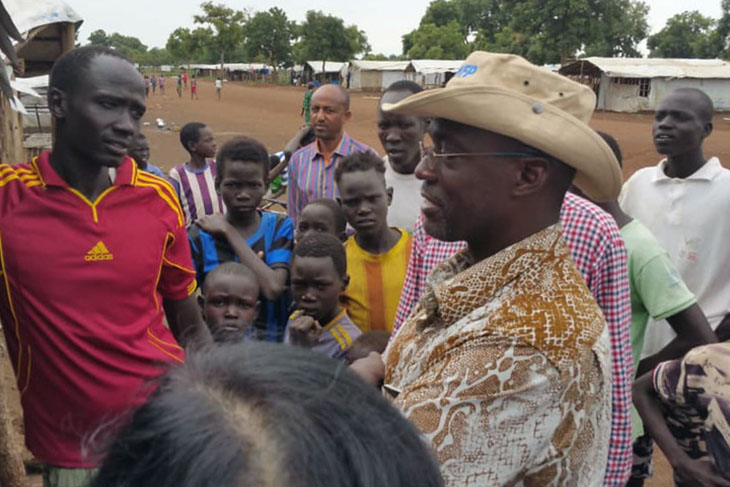 |
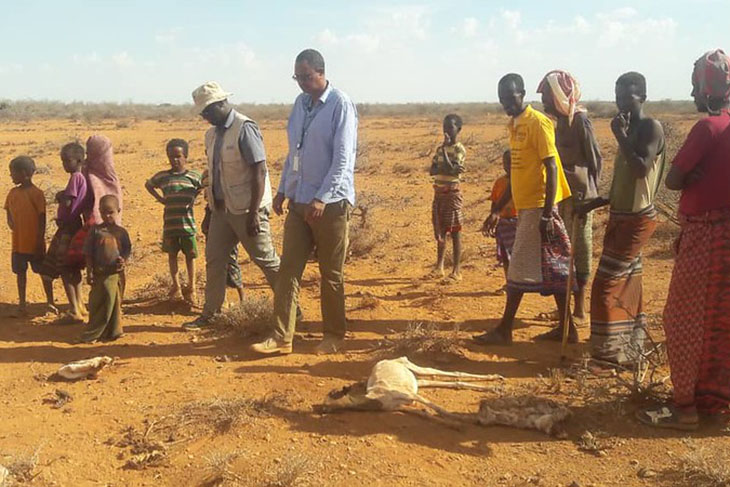 |
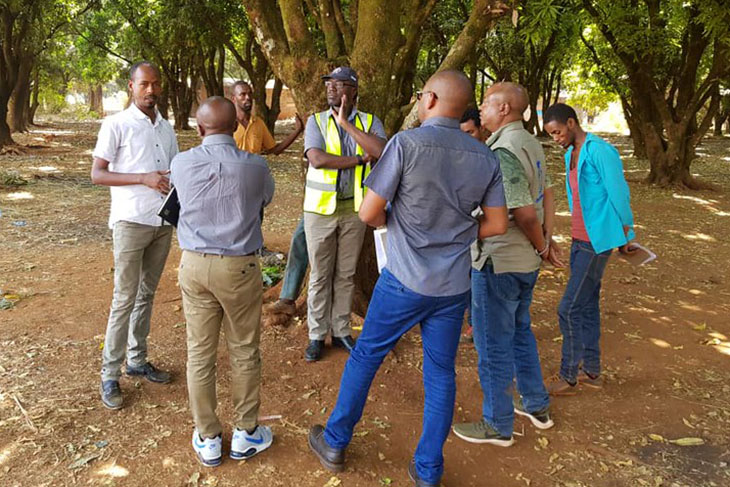 |
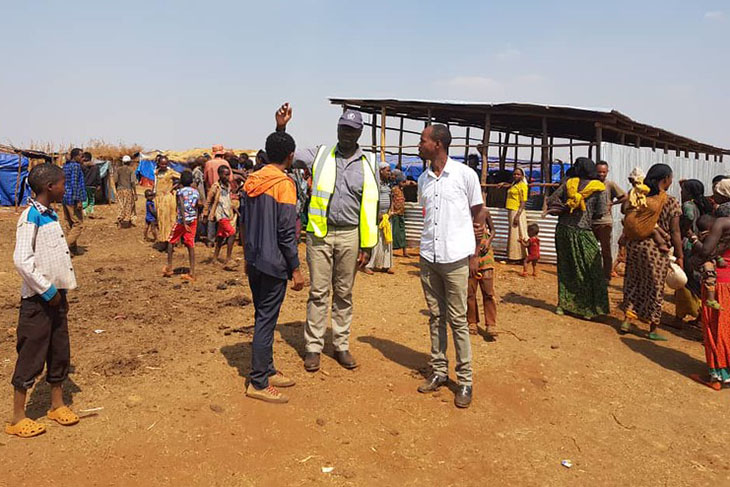 |
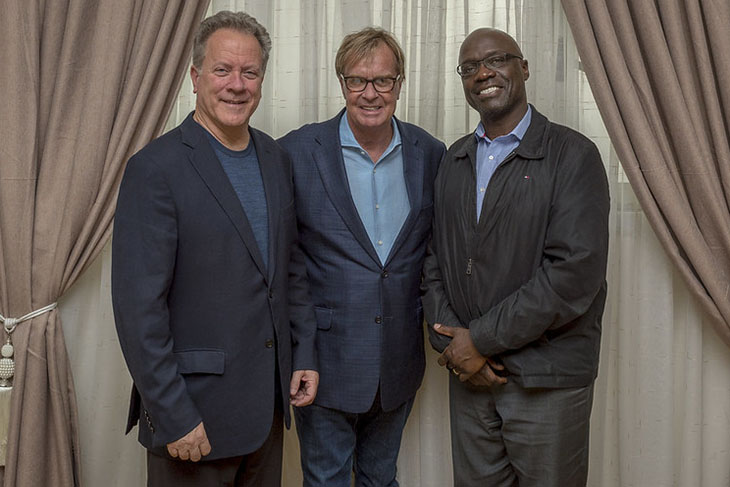 |
Noble Work, Nobel Prize
The World Food Programme earned the Nobel Peace Prize with the help of an alumnus who is passionate about feeding the hungry
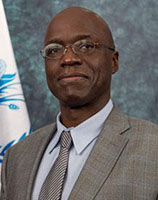 Dr. Steven Were Omamo was at his desk at the World Food Programme office in Addis Ababa, Ethiopia this past October when he glanced at his phone and
saw a message that his organization had been awarded the 2020 Nobel Peace Prize.
Dr. Steven Were Omamo was at his desk at the World Food Programme office in Addis Ababa, Ethiopia this past October when he glanced at his phone and
saw a message that his organization had been awarded the 2020 Nobel Peace Prize.
For Were, a 1986 Fresno State agricultural business graduate, it was a landmark moment in an already remarkable career. For most of the past 15 years, he has overseen a variety of areas for the global leader in food assistance that will help feed over 100 million people in 88 countries this year.
As the World Food Programme representative and country director for Ethiopia, he helps facilitate resources to address acute hunger or need related to emergencies, natural disasters, outbreaks and conflicts. He also leads efforts that focus on root causes of hunger, such as lack of access to water or markets.
“We were stunned, overjoyed and humbled,” Were said of the Nobel Prize. “To have the world take notice of our work is so special given the communities we see in need every day. Even though conditions facing these communities can be shocking, there’s always deep resilience to be found. The human spirit is strong and can always be reaffirmed by help and generosity.”
Fresno State was a key step in his path towards understanding the fundamental economic demands that have led him to over 40 countries around the world.
“On reflection, many of the faculty emphasized the demand side, which became a very natural way for me to approach and study issues in the food and agriculture industry,” Were said. “There was also a groundedness that you can view agriculture as a business at any level. Those market principles helped me with my research, whether it involved big commercial outlets, co-ops or small-scale farming in remote parts of the world.”
He first learned about the university as a senior at St. Mary’s High School in Nairobi, Kenya while searching an American university reference book for respected agricultural programs.
His father, William Odongo Omamo, recommended the Central Valley.
As a graduate agricultural student at Oregon State University in the 1960s, his father had seen California’s large-scale farming and understood the potential applications. One of Kenya’s most successful sugar growers, William and Were’s mother, Joyce Achola Omamo, built a diversified 3,000-acre farming operation in the fertile, highland region. He also served as a minister in the Kenyan government, covering a number of areas, including agriculture, science, research and the environment.
“My father used to say ‘you eat your sweat,’ and that mentality fueled him to expand his operations and achieve great things,” Were said. “From him (and my mother’s example) I learned to focus and work extra hard beginning in elementary school. Education didn’t come easy to me at that point, but they stressed the benefits of a good education and doing well."
Those values were shared among the family as fourteen of his siblings attended universities, and the other sibling also chose a post-secondary program.
Were vividly remembers arriving in Fresno in the summer of 1982 and an airport thermometer that read 112 degrees. There to greet the 19-year-old at the terminal were Dr. John Shields, an agricultural economics faculty member, and his wife, Elizabeth Shields, MBA, a campus finance lecturer, who had kindly agreed to serve as his host family.
“John and Liz were so generous,” Were said. “Besides John’s advising, they were always there to help me, whether to find my first apartment, inviting me to Thanksgiving celebrations or offering advice on graduate school. I didn’t go back to Kenya for four years, so Fresno State truly was my home. The Shields, and the large group of international students that were on campus, were like a family to me.”
Other international students were also treated like family by the Shields, who met in Botswana, where both were teaching at the time. They arrived on the Fresno State campus in 1978, and eventually hosted other exchange students from Uganda and Botswana.
Like many college students, Were explored multiple academic directions initially and took a variety of general education and science courses. However, he settled on agricultural business as a major as a junior after John Shields returned from a stint in Washington D.C. with USAID, an international development and assistance organization.
“John and Were really had a connection through ag economics,” said Elizabeth Shields. “Were was part of a group of high-achieving students that John saw a lot of potential in, so he had them work on research papers and pre-graduate school curriculum. Were had an impressive poise and bearing even back then. We felt like he had a lot ahead of him professionally, so John encouraged him to go as far as he could.”
That connection has endured for decades through emails, phone calls and occasional visits, no matter what continent Were is on.
John Shields passed away in 2018, but his impact on Were has endured through the memory of his love for travel, his insistence on clear thinking and writing, and his and Elizabeth’s commitment to helping others (that coincidentally earned the Shields a Top Dog Award from the campus alumni association earlier this year).
After his undergraduate degree, Were followed with a master’s degree from the University of Connecticut with research into agricultural marketing. He added a doctorate from Stanford University that focused on marketing and engaging small farmers.
His first post-college position was as a lecturer at Egerton University, which specializes in agriculture and is Kenya’s oldest university, and where his father had served as the first African Principal of then-Egerton College.
After Egerton, Were moved into full-time research into international agricultural development with organizations in Kenya, Uganda, the Netherlands and the United States. That led to leadership positions since 2006 with international advocacy and aid programs, mostly with WFP, which has more than doubled in size to an $8 billion annual operation the past decade.
Today, in the third year of Were’s current position, he oversees programs that work with government agencies, suppliers, shipping and storage channels. That network of food assistance and support helps an average of 8 million people annually in Ethiopia, 700,000 of whom are refugees from neighboring countries.
Examples of recent innovative Ethiopian WFP support programs include small farmer livestock insurance programs, family assistance vouchers for fresh, local produce, and sustainable crop production training. Similarly, the COVID-19 pandemic has led to organized responses to aid medical supply distribution and a new field hospital by his team.
Central to the WFP’s worldwide approach is a commitment to purchasing much of the food it distributes from nearby sources, thereby boosting local economies while meeting urgent needs. For Ethiopia, that double benefit is extra vital since agriculture already accounts for half of its national GDP and more than three-fourths of its total employment.
WFP’s recent growth has mirrored Ethiopia’s, which in recent decades has periodically ranked as one the world’s fastest growing economies. However, its population of over 110 million people, which ranks among the world’s top 15 biggest countries, still averages just under $1,000 per capita annually in income, and is particularly vulnerable to unexpected disasters.
“I am fortunate to be a part of WFP because we see the immediacy of our work every day, from the lives saved and the people that are helped,” Were said. “I have always had an interest in food systems and studying ways to minimize the gaps between supply and demand. Trying to create more equitable food systems by sharing others’ abundance and generosity is a great privilege.”
— Geoff Thurner is a communications specialist for the Jordan College of Agricultural
Sciences and Technology at Fresno State (and an abridged version appeared in the June
2021 issue of the Fresno State magazine).